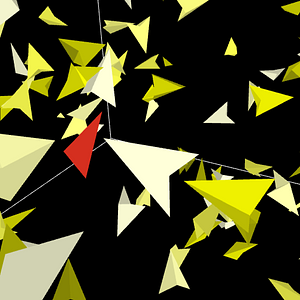- About the Course:
This course will explore how to use agent-based modeling to understand and examine a widely diverse and disparate set of complex problems. During the course, we will explore why agent-based modeling is a powerful new way to understand complex systems, what kinds of systems are amenable to complex systems analysis, and how agent-based modeling has been used in the past to study everything from economics to biology to political science to business and management. We will also teach you how to build a model from the ground up and how to analyze and understand the results of a model using the NetLogo programming language, which is developed and supported at Northwestern University by Uri Wilensky. We will also discuss how to build models that are sound and rigorous. No programming background or knowledge is required, and the methods examined will be useable in any number of different fields.
While this course is in session, the first unit will be completely free and open; we request a modest tuition to continue through the course and to receive a certificate. Once the course is closed, the videos and quizzes will all be open and freely available. A limited number of scholarships are available, please see the FAQ for more details.
- About the Instructor(s):
 Bill Rand is an assistant professor of Business Management at the Poole College of Management at North Carolina State University and a computer scientist by training. He recently co-authored a textbook on agent-based modeling with Uri Wilensky, the author of the NetLogo programming language. He is also the author of over 50 scholarly papers, many of which use agent-based modeling as their core methodology. He received his doctorate in computer science in 2005 from the University of Michigan, and was also awarded a postdoctoral fellowship to Northwestern University, where he worked directly with Uri Wilensky as part of the NetLogo development team.
Bill Rand is an assistant professor of Business Management at the Poole College of Management at North Carolina State University and a computer scientist by training. He recently co-authored a textbook on agent-based modeling with Uri Wilensky, the author of the NetLogo programming language. He is also the author of over 50 scholarly papers, many of which use agent-based modeling as their core methodology. He received his doctorate in computer science in 2005 from the University of Michigan, and was also awarded a postdoctoral fellowship to Northwestern University, where he worked directly with Uri Wilensky as part of the NetLogo development team.- Course Team:
This Year:
 Chathika Gunaratne is a PhD candidate in Modeling and Simulation at the University of Central Florida and a Graduate Research Assistant for the Complex Adaptive Systetms Lab. He has a MS in Modeling and Simulation (2015) from the University of Central Florida and a BSc in Computer Science from the University of Colombo School of Computing, Sri Lanka. Chathika has worked on several projects studying complex systems through a combination of agent-based modeling and evolutionary computation, including simulation of Aedes aegypti carrying capacity in rural environments, innovation ecosystems, and online social media interaction. He is currently developing a framework, evolutionary model discovery, combining agent-based modeling, distributed genetic programming, and global sensitivity analysis that enables modelers to automate the exploration of large spaces of combinations of factors of human decision making and quantify importance of these factors towards target collective phenomena. Chathika's research has been supported by grants from DARPA, NSF, and Amazon Web Services. He has also worked in the simulation industry as a serious games developer implementing crowd simulations for Simcentric Technologies, and as a modeling and simulation specialist, using agent-based modeling to optimize crowd dynamics for the Universal Studios theme park.
Chathika Gunaratne is a PhD candidate in Modeling and Simulation at the University of Central Florida and a Graduate Research Assistant for the Complex Adaptive Systetms Lab. He has a MS in Modeling and Simulation (2015) from the University of Central Florida and a BSc in Computer Science from the University of Colombo School of Computing, Sri Lanka. Chathika has worked on several projects studying complex systems through a combination of agent-based modeling and evolutionary computation, including simulation of Aedes aegypti carrying capacity in rural environments, innovation ecosystems, and online social media interaction. He is currently developing a framework, evolutionary model discovery, combining agent-based modeling, distributed genetic programming, and global sensitivity analysis that enables modelers to automate the exploration of large spaces of combinations of factors of human decision making and quantify importance of these factors towards target collective phenomena. Chathika's research has been supported by grants from DARPA, NSF, and Amazon Web Services. He has also worked in the simulation industry as a serious games developer implementing crowd simulations for Simcentric Technologies, and as a modeling and simulation specialist, using agent-based modeling to optimize crowd dynamics for the Universal Studios theme park.Last Year:
 Anamaria Berea has a dual PhD, one in international business and economics (2010) and one on computational social science (2012). She has a strong background in complexity theory and economics, working at the intersection of economics and computational methods for the past 8 years. Her projects include the study of company growth, diffusion of fashions and fads, social media impact on crowd-funding success, the emergence of language and communication in socio-biological networks, geopolitical and science and technology forecasting, recommender systems for students applying to college, mass media sales forecasting, simulation of conflicts in Afghanistan-Pakistan area and many more. Her work has been published in Journal of Washington Academy of science, Decision Analytics, AAAI Proceedings, Quantitative Finance, Handbook of Human Computation and Journal of Strategic Security. Her research has been supported by grants from ONR, IARPA, DARPA and the National Academies of Sciences. She is a member of the Washington Academy of Sciences and Eastern Economics Association.
Anamaria Berea has a dual PhD, one in international business and economics (2010) and one on computational social science (2012). She has a strong background in complexity theory and economics, working at the intersection of economics and computational methods for the past 8 years. Her projects include the study of company growth, diffusion of fashions and fads, social media impact on crowd-funding success, the emergence of language and communication in socio-biological networks, geopolitical and science and technology forecasting, recommender systems for students applying to college, mass media sales forecasting, simulation of conflicts in Afghanistan-Pakistan area and many more. Her work has been published in Journal of Washington Academy of science, Decision Analytics, AAAI Proceedings, Quantitative Finance, Handbook of Human Computation and Journal of Strategic Security. Her research has been supported by grants from ONR, IARPA, DARPA and the National Academies of Sciences. She is a member of the Washington Academy of Sciences and Eastern Economics Association.
- Class Introduction:
- Class Introduction
- How to use Complexity Explorer:
- How to use Complexity Explorer
- Enrolled students:
-
1,451
- Course dates:
-
09 Jul 2018 4pm UTC to
10 Oct 2018 5:59am UTC - Prerequisites:
-
None
- Like this course?
- Donate to help fund more like it
- Twitter link
- Follow Course on Twitter
Syllabus
- What is Agent-Based Modeling and Why Should You Use It?
- Building a Simple Model
- Extending Models
- Creating Agent-Based Models
- The Components of an Agent-Based Model
- Analyzing Agent-Based Models
- Verification, Validation, and Replication
- History of ABM and Classic Models
- Advanced ABM
